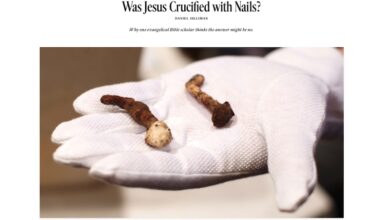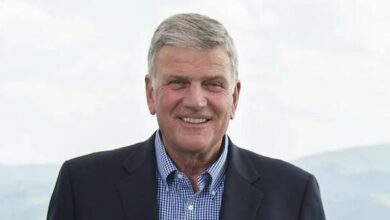Sam Brownback is a diplomat, chosen by the Trump administration to travel the world promoting religious freedom. But he sometimes describes himself as a salesman, and he thinks he’s got a great deal for global leaders.
If they’ll agree to strengthen religious freedom protections in their countries, to defend the rights of people of faith and no faith, he can promise a safer, more prosperous future, as well as more schools, hospitals and acts of service.
“I sound like one of those $19.95 commercials,” he told attendees at this week’s International Law and Religion Symposium in Utah. “On top of that, we’ll also give you less terrorism and more economic growth.”
Brownback, who was sworn in as the U.S. Ambassador-at-large for international religious freedom on Feb. 1, needs more policymakers to take him up on this offer. Around the world, it’s becoming more difficult to stay true to your beliefs.
“How are we doing in the world on religious freedom? Unfortunately, I think my answer is … I don’t think we’re doing very good,” he said during his keynote address.
Brownback described government interference with personal faith in China, where Muslims and Christians are closely monitored and some houses of worship have been shuttered. He mentioned the persecution of the Rohingya Muslim community in Myanmar and the imprisonment of an American pastor in Turkey. He recounted traveling through northern Iraq and seeing piles of rock that used to be churches.
“This is just a bit of what’s taking place in the world today,” he said, citing a Pew Research Center survey that found nearly 8 in 10 people worldwide are affected by religion-related government restrictions or social hostilities.
It’s a daunting situation, and Brownback’s work sometimes amounts to just “triage,” he said. He travels to the places with the most pressing needs or to the leaders who want to work with him and then he offers his sales pitch.
“More religious freedom leads to more freedoms” in general, and a “better and growing country and society,” he said.
Brownback, who served as governor of Kansas from 2011 until this year, helped create his current job 20 years ago, while serving in the Senate. He was a co-sponsor of the International Religious Freedom Act of 1998, which mandated the ambassador-at-large position and an annual report on international religious freedom violations.
“A number of us in Congress didn’t think the State Department was taking matters of religious freedom or really taking faith seriously enough in foreign policy,” he said.
Although the act received bipartisan support, many political and religious leaders have questioned its value over the past two decades. People worry about the optics of U.S. policymakers interfering with faith communities in other countries and wonder if issuing reports and statements leads to meaningful change.
“Generally, the effectiveness of this (ambassador) position has been marginal in the sense that what it’s been reduced to is naming and shaming,” said Sean Casey, who previously served as the director of the State Department’s Office of Religion and Global Affairs, to the Desert News last year. “There’s not a lot of evidence that a foot stomp and annual report has any diplomatic impact at all.”
Brownback, who is the fifth person to hold his post, believes U.S. activism around religious freedom does matter.
“Religious freedom is foundational in the United States,” he said. “We’re going to fight for it.”
In July, Brownback, with the support of the Trump administration, helped host a first-of-its-kind ministerial on religious freedom, which brought together representatives from 84 different countries. The event brought attention to survivors of religious persecution, as well as the communities that still suffer, and paved the way to stronger global partnerships.
Over the past three months, Brownback has been traveling to continue the conversations that started at the ministerial, encouraging other countries to host their own regional meetings on religious freedom, he told symposium participants. The State Department plans to host an international gathering again next year.
“I think, long term, what’s really going to have an impact are these ministerials,” said Cole Durham Jr., director of BYU’s Center for Law and Religion Studies. “They’re bringing together people focused on religious freedom from a lot of different countries.”
To end religion-related violence around the world, everyone needs to commit to doing what they can to help, Brownback said. He noted that college students can host discussions on religious freedom and faith communities can choose a country or crisis to study and discuss.
“It takes not only the government” to protect religious freedom, he said. “It takes civil society. It takes the faith community. It takes the legal community. It takes all of us pulling together to really push this fundamental freedom forward.”






